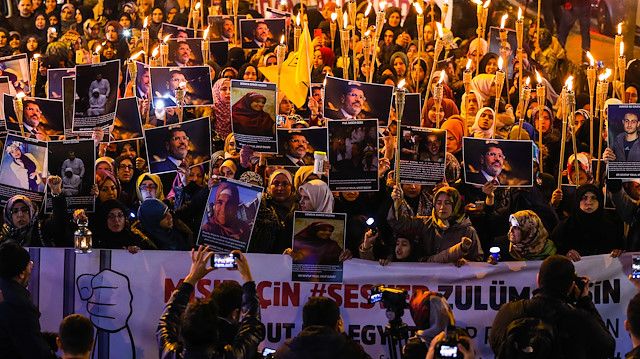

Turkey hosts rally for Egyptian prisoners
Torchlight march was held in Istanbul to stop human rights violations in Egypt
A large number of Egyptians and Turkish civil society groups attended a torchlight march in Istanbul to draw attention to unlawful detentions by the Egyptian regime.
The march started near the landmark Fatih Mosque and end at Saraçhane Park.
On the occasion of Human Rights Day, the Solidarity Group for Egyptian Prisoners urged people to voice concern over the human rights violations in Egypt, Jerusalem, Gaza, Syria, Iraq, Yemen, East Turkistan and Myanmar.
"We condemn oppressors all over the world, regardless of their religion, language or race and stand for the freedom of innocent people who are facing oppression," the group said in a statement.
The group said thousands of innocent people were killed by the Egyptian regime which overthrew the country's first democratically elected president, Mohammed Morsi -- who was ousted in a 2013 military coup and died this June in the middle of a trial.
The number of people, detained in Egypt's prisons, mainly members of the Muslim Brotherhood and other political opponents, was estimated to be over 65,000, it added.

There are 154 women languishing in prisons across the country, it said.
Many people, especially young men, were sentenced to death by the regime, with about 60 of these executions carried out without families being informed.
The prisoners, it said, were trying to raise awareness on their "unbearable conditions" by going on hunger strikes from time to time.
"Prisoners are not allowed to meet with relatives and lawyers, while those who are sick are deprived of receiving medical treatment."
It also added that people from different parts of the world are sending letters to the oppressed people in Egypt's prisons to show them solidarity, and to show the prison administrators that "the people they are torturing are not alone".
"We want to be a light of hope for our brothers and sisters in prisons and spread fear to the oppressors," it said.
Morsi, a leading member of Egypt's Muslim Brotherhood, won Egypt's first free presidential election in 2012.
After only a year in office, he was ousted and imprisoned in a military coup led by then-Defense Minister and current President Abdel-Fattah al-Sisi.
At the time of his death in June, Morsi faced a host of legal charges, which he, along with numerous human rights groups and independent observers, said were politically motivated.
#Egypt
#Human Rights Day
#human rights violations
#march
#oppressors
#prisoners
#Solidarity Group for Egyptian Prisoners
#torchlight rally

